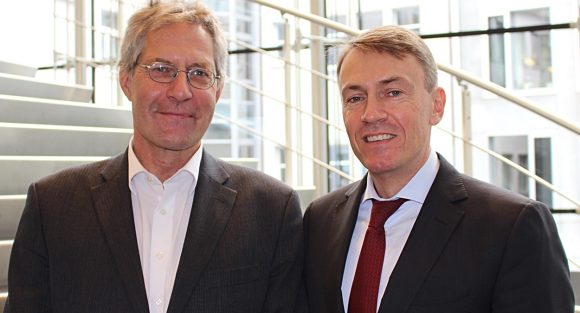
Interview with Thomas and Konrad
Interview with Thomas and Konrad
Can you tell us about the DisAbility network at UBS?
(Konrad) There are actually quite a few DisAbility networks at UBS, organized by location. The one we're involved in is the DisAbility Network in Switzerland. We are about 20-22 members, primarily from the Zurich area. The disabilities represented are wide-ranging, including hearing challenges, severely impaired motor skills and coordination, voice output, and cognitive challenges. Our members participate in monthly lunches, volunteering events on a yearly basis, and general exchanges.
Why is it so important?
(Thomas) It is important because it is part of both diversity and inclusion at UBS, but it is not so obvious. We talk about things like gender diversity and the Pride network, but we often forget that people with disabilities – I actually see the words "special needs" as more inclusive and positive than "disability," which can seem negative. - are part of our workplace community as well. One of the panelists at a recent event mentioned a study that says teams with someone with a disability are much more innovative than other teams. That was the first time I’ve heard that. It shows there is a real benefit to have someone with a disability on the team.
What is your role?
(Thomas) My role is to act as an ambassador. As a Group Managing Director, I can open some doors that might not open otherwise. I think my job is to make sure people know we have colleagues who have different needs and they are an important part of our team.
Can you tell us about the recent lunch and learn you hosted?
(Konrad) We held this event to raise awareness of disabilities, to discuss how we support people with disabilities within UBS, to illuminate the challenges, to discuss how to assist employees with disabled children, how to increase the number of employees with disabilities at UBS, and similar topics. The event was extremely well received and it was clear from the interactions between the audience and panel that the audience had a very strong affinity for the subject.
How do you see UBS support employees who have disabilities?
(Thomas) I think we could do more. But the people I know with disabilities experience huge support from their team and also their line manager. The bank works hard to remove obstacles to working effectively, which is fantastic. For example, while I've not met anyone personally, I see no reason why an advisor cannot be in a wheelchair, and I would fully support this at UBS.
How do you see UBS support employees with children with disabilities?
(Thomas) My experience as the father of an autistic young man is very positive. If you are transparent and say what you need, I think the bank will undertake a lot to support you. But it’s important to say it. Some people might not think they should speak up, but if you are transparent I can't image that you won’t be supported. I have always been supported.
What resources and networks are available to employees?
(Konrad) We have the DisAbility networks mentioned above, as well as two forums in an internal social medium called Connections. One is a closed forum exclusively for members, and the other is open to all employees interested in the topic. In addition, we have an intranet page dedicated to the subject. Our monthly lunches also offer possibilities for interaction, as well as a certain number of events we organize per year such as the ones mentioned above.
How have you seen UBS create a supportive and inclusive environment?
(Konrad) This is really a work in progress and one of the main objectives of our network as well as the diversity context generally. On the interpersonal level, we strive to empower the line managers of people with disabilities. They are the key players in this context.
Are you interested in joining our team?
Are you interested in joining our team?
Visit our job board and you may find something perfect for you.
Enjoyed reading this? You might also like…
Enjoyed reading this? You might also like…

